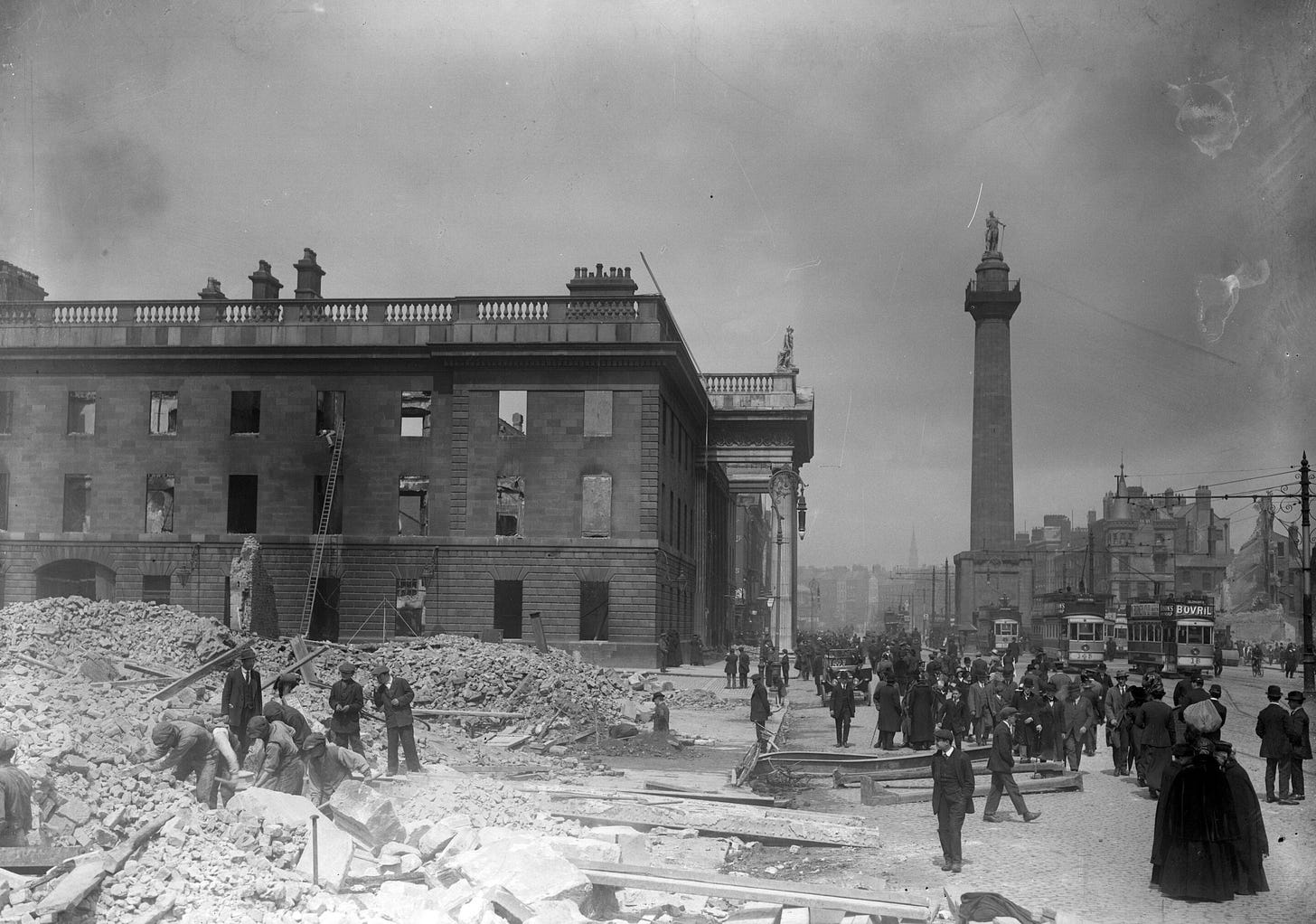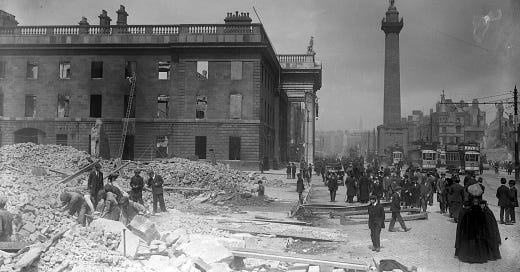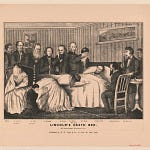
This Day in Legal History: Easter Rising
On April 24, 1916, the Easter Rising erupted in Dublin as Irish republicans launched a bold and ultimately tragic insurrection against British rule. The event, intended to establish an independent Irish Republic, had enormous legal and constitutional consequences that would ripple through British and Irish law for years. Roughly 1,200 rebels seized key buildings across Dublin, proclaiming the establishment of the Irish Republic from the steps of the General Post Office.
In response, the British government declared martial law and deployed thousands of troops to suppress the rebellion. Courts-martial were swiftly convened, and between May 3 and May 12, fifteen rebel leaders were executed, including Patrick Pearse, James Connolly, and Thomas Clarke. These summary executions, carried out without the protections of civilian trial, shocked many in Ireland and Britain and were later criticized as legally excessive and politically tone-deaf.
The use of military tribunals rather than civilian courts raised serious questions about the limits of legal authority during wartime and the rights of those accused of political violence. The Rising also marked a critical turning point in British colonial legal practice, highlighting the inherent tension between empire and constitutional rule.
In the wake of the rebellion, the British government passed additional emergency laws to manage dissent in Ireland, but these legal measures only deepened nationalist sentiment. The Easter Rising set the stage for the Irish War of Independence, the 1921 Anglo-Irish Treaty, and ultimately the creation of the Irish Free State in 1922.
The legal legacy of April 24 is one of sharp contrast: between the rigid imposition of imperial law and the revolutionary demand for self-determination. It remains a powerful example of how law can be both a tool of control and a symbol of contested legitimacy.
The Consumer Financial Protection Bureau (CFPB) has agreed to drop its appeal in a longstanding legal battle with PayPal over a 2019 rule that required digital wallet providers to disclose fees using a standardized form originally intended for prepaid cards. The decision came through a joint filing on April 21 in the U.S. Court of Appeals for the D.C. Circuit, following a March 2024 district court ruling in PayPal’s favor that limited the reach of the rule.
The CFPB’s regulation extended fee disclosure mandates for prepaid cards to digital wallets, despite the agency's own acknowledgment that most digital wallets don’t charge such fees. PayPal contested the rule soon after its issuance, arguing that digital wallets function differently from prepaid cards since they store payment credentials rather than actual funds. In contrast, prepaid cards are used to store and spend cash directly.
The legal journey began when Judge Richard J. Leon initially sided with PayPal in 2020, but his ruling was overturned by the D.C. Circuit in 2023, prompting a remand. Leon again ruled for PayPal in March 2024, leading the CFPB to appeal before ultimately deciding to drop the case.
This withdrawal marks the second recent instance of the CFPB, under acting Director Russell Vought, stepping back from litigation challenging its rules. A week prior, the agency also agreed to halt enforcement of a proposed $8 cap on credit card late fees amid a separate lawsuit. PayPal is represented by WilmerHale which, you will of course remember, has been targeted by a Trump executive order.
CFPB Agrees to Halt Appeal of PayPal Win on Digital Wallet Rule
President Trump announced via Truth Social that he is suing the law firm Perkins Coie, accusing it of committing “egregious and unlawful acts,” specifically pointing to the actions of an unnamed individual at the firm. However, it remains unclear whether Trump intends to file a new lawsuit or was referring to ongoing legal disputes.
Last month, Trump signed an executive order that aimed to terminate federal contracts with clients of Perkins Coie if the firm had performed any work on them. In response, Perkins Coie sued the administration, claiming the order was unconstitutional.
Trump’s legal team also requested the recusal of U.S. District Judge Beryl Howell from overseeing that case, alleging a “pattern of hostility” toward the president. Trump repeated his criticism of Judge Howell in his latest post, calling her “highly biased.”
The legal conflict adds to Trump’s ongoing confrontations with the judiciary and firms linked to Democratic causes. Perkins Coie has historically represented Democratic interests, making the dispute politically charged.
Trump says he is suing Perkins Coie law firm | Reuters
Law firms Perkins Coie and WilmerHale asked federal judges in Washington, D.C., to permanently block executive orders issued by President Donald Trump. The firms argue the orders are unconstitutional acts of political retaliation. These orders sought to revoke government contracts held by their clients and restrict the firms' access to federal buildings, citing their ties to Trump's legal and political opponents.
The legal battle marks a significant escalation between major law firms and the Trump administration. U.S. District Judge Beryl Howell heard Perkins Coie’s request for summary judgment, while Judge Richard Leon handled WilmerHale’s case later in the day. Both judges had already issued temporary blocks on Trump’s orders in March.
The Department of Justice defended the executive orders as valid exercises of presidential authority. Meanwhile, other prominent firms like Paul Weiss and Skadden Arps have settled with the White House to avoid similar orders, agreeing to provide pro bono services and other terms reportedly totaling nearly $1 billion in value.
The legal community has widely condemned the executive orders. Hundreds of firms and legal organizations argue the moves were designed to chill legal representation against Trump, infringing on the right to counsel and undermining the legal profession’s independence. Some attorneys at firms that settled have resigned in protest.
Law firms targeted by Trump ask judges to permanently bar executive orders against them | Reuters
The State Bar of California plans to ask the California Supreme Court to lower the passing score for the February 2025 bar exam after a troubled rollout that included technical and logistical failures. The proposed score of 534 is below the 560 recommended by the bar's testing expert. This score adjustment would apply to all test takers, regardless of the specific issues they faced.
February’s exam marked the first time California administered a hybrid bar test, offered both remotely and in-person, and without components of the long-used national bar exam. Although the change aimed to reduce costs, it resulted in significant problems such as software crashes and intrusive proctoring interruptions. It's unclear how many of the 4,300 examinees were affected, but the State Bar has opened an investigation into the widespread issues.
The bar also recommended imputing scores for test takers unable to complete key sections, a process that estimates performance based on completed answers. The Committee of Bar Examiners acknowledged the challenge of crafting a remedy that is both fair and preserves the integrity of the exam.
In addition to adjusting scores, the committee is considering provisional licensing programs that would allow affected test takers to practice under supervision while awaiting full licensure. Final test results are due May 2, and the Supreme Court is expected to rule on the score change request by April 28. The committee will meet again on May 5 to consider further options.
California bar seeks to reduce pass score after disastrous exam rollout | Reuters













Share this post